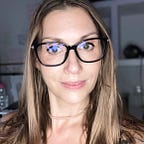A new paradigm for self-healthcare
Uncertain times are great teachers. In these past weeks of health-based fear, many of us may have re-assessed our relationship to self-care. I have spent many years contemplating how exactly we can orient our self-care strategy, and today I felt like sharing.
In my 18 years in the wellness field, I have listened and observed very carefully. I have tried to form a compassionate philosophy around self-care, free of judgement and endowed with common sense.
People can, broadly, be divided into two distinct groups:
1. Those who eschew self-care and depend completely on the opinion of the medical community and reject all responsibility for their own health, disempowering themselves.
2. Those who are radically independent about their self care, to the point of avoiding and questioning mainstream medical opinion, disempowering doctors and professionals.
It is my opinion that neither path is correct, because each is extreme. There is another way, a middle way, that is likely to give better long-term outcomes while empowering both patient and practitioner. It is the middle way of healthcare management.
A new paradigm for self-healthcare: prevent, but don’t preclude.
When I worked with breast cancer patients, in lymphedema rehabilitation, the first question I always asked on my intake questionnaire was “how was the cancer detected”? Time and time again, I heard a similar tale: “I felt that there was something wrong, so I went to my Doctor. They could not find anything, I had a mammogram but it was negative. But, I knew that there was something wrong.” Many repeated this process various times, over a period of some years — going to the Doctor, getting a negative, going home still suspicious, repeat. When, at last, a positive diagnosis was given, it came as both a shock and a relief. Their fears had been confirmed, but one can hardly say that a cancer diagnosis is positive. Still, at least therapy would then start and they began to feel their case was being take seriously. The pertinent part is this: I would ask “what, in the meantime, did you do to help yourself”. Usually, the answer was nothing.
On the other side, as a complementary therapist, I had many clients with serious health issues who used herbs, supplements and mind-body techniques to make themselves feel better. They also got stuck in a loop, going around the houses to all the therapists, never getting a clear diagnosis, not feeling well, but carrying on seeking. Many of these people were highly suspicious of doctors, and most would not consult with a medical professional even when symptoms warranted it. I personally know people who lived exceptionally healthy lifestyles who received cancer diagnoses in Stage IV, when medical science has no more options other than pain relief. Perhaps if they had visited a doctor earlier, the outcome may have been different.
Both scenarios have two things in common: patients stuck in a loop, and unable to put a name of their condition.
Get out of the loop and on the right track
I formulated an idea, a strategy, for self-care, that falls right in the middle of the two extremes and empowers both patient and professional. I say: as long as a condition does not have a medical diagnosis, that is, as long as the MDs cannot put a name on it, then use preventative medicine such as supplements, diet, and mind-body techniques. But, seek a medical diagnosis, blood tests, imaging, whatever, and if the pattern of symptoms leads to diagnosis, then adhere to the advice of the medical community, as well as practising self-care. Sounds pretty simple, right?
The Middle Way
Not every condition is easily named, or treated by modern medicine. But modern medicine has some amazing tools and most healthcare professionals have studied for long years because they have a true vocation to help. Still, modern medicine has its limitations, can cause collateral damage, and does not work the same in all patients all the time. So, it’s best to use it as a support and not a pillar, especially when conditions can be managed by less toxic or intrusive measures.
Not every complementary therapy works as it says it does, nor do they work the same in each patient. This is why they don’t have medical recognition — the old clinical trials conundrum. Still, there is a reason that things like surgery, analgesia and immunisations exist. There was — and is — a need for it, and this need was not met by herbal medicines, nor by sunshine, raw food or breathing. So use complementary medicine, but also trust your healthcare provider.
I know that some people will feel challenged by my viewpoint, but dogmas exist on both sides of the question and I am simply arguing that the best path probably lies somewhere in the middle.
A shift in self-healthcare is nigh.
In the coming months and years, I predict a change in consumer patterns around self-healthcare. I think that some of those who formerly relied only on medical diagnosis will come to understand that they, too, are empowered to care for themselves and prevent disease through weight management, care of the immune system, healthy lifestyle choices and right thinking.
I predict that some of those who previously rejected modern medical science, like antibiotics, immunization and some invasive procedures will come to see that modern medicine isn’t all bad.
I think that the Wellness sector, in which I have happily worked since 2002, will see important growth as it serves both groups. I hope that MDs will start to value complementary therapies, and that complementary therapists will be more open-minded about scientific medicine.
After all, it’s our health that is at stake, and there is nothing more sacred than that.
So, to your very good health! May you be well and happy.
